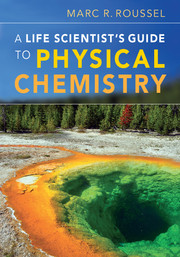Book contents
- Frontmatter
- Contents
- Preface
- 1 Orientation: what is physical chemistry about?
- Part One Quantum mechanics and spectroscopy
- Part Two Thermodynamics
- 4 Thermodynamics preliminaries
- 5 The First Law of Thermodynamics
- 6 The Second Law of Thermodynamics
- 7 Free energy
- 8 Chemical equilibrium and coupled reactions
- 9 Non-ideal behavior
- 10 Electrochemistry
- Part Three Kinetics
- Appendix A Standard thermodynamic properties at 298.15 K and 1 bar
- Appendix B Standard reduction potentials at 298.15 K and 1 bar
- Appendix C Physical properties of water
- Appendix D The SI system of units
- Appendix E Universal constants and conversion factors
- Appendix F Periodic table of the elements, with molar masses
- Appendix G Selected isotopic masses and abundances
- Appendix H Properties of exponentials and logarithmic functions
- Appendix I Review of integral calculus
- Appendix J End-of-term review problems
- Appendix K Answers to exercises
- Index
4 - Thermodynamics preliminaries
from Part Two - Thermodynamics
Published online by Cambridge University Press: 05 June 2012
- Frontmatter
- Contents
- Preface
- 1 Orientation: what is physical chemistry about?
- Part One Quantum mechanics and spectroscopy
- Part Two Thermodynamics
- 4 Thermodynamics preliminaries
- 5 The First Law of Thermodynamics
- 6 The Second Law of Thermodynamics
- 7 Free energy
- 8 Chemical equilibrium and coupled reactions
- 9 Non-ideal behavior
- 10 Electrochemistry
- Part Three Kinetics
- Appendix A Standard thermodynamic properties at 298.15 K and 1 bar
- Appendix B Standard reduction potentials at 298.15 K and 1 bar
- Appendix C Physical properties of water
- Appendix D The SI system of units
- Appendix E Universal constants and conversion factors
- Appendix F Periodic table of the elements, with molar masses
- Appendix G Selected isotopic masses and abundances
- Appendix H Properties of exponentials and logarithmic functions
- Appendix I Review of integral calculus
- Appendix J End-of-term review problems
- Appendix K Answers to exercises
- Index
Summary
Thermodynamics is one of the most useful pieces of science you'll ever learn. Given a little knowledge of thermodynamics, one can understand and explain a broad range of natural phenomena and technological applications. In this book, for instance, we will touch on energy use in living organisms, energy production by fuel-burning engines and spontaneity of chemical processes. This list of topics hardly scratches the surface of the phenomena that can be understood using thermodynamics.
When chemists say “thermodynamics,” they usually mean “equilibrium thermodynamics,” also known as “classical thermodynamics.” This is a theory that emphasizes transformations between equilibrium states. This is important because it is difficult to even define some important quantities like temperature for systems that are out of equilibrium. However, it does mean that we have to be careful how we apply the theory, which requires a certain precision of thought, language and notation. The issues dealt with in the rest of this chapter may seem pedantic or trivial to you, but they are critical prerequisites to understanding anything else in thermodynamics.
The domain of classical thermodynamics
Classical thermodynamics is a theory of equilibrium states and of transformations between these states. What do we mean by equilibrium? A system is in equilibrium if its state, under the given conditions, does not change with time. This may seem like an obvious definition, but in thermodynamics, even “state” has a technical meaning: the state of a system is the collection of all its observable properties (pressure, volume, chemical composition etc.).
- Type
- Chapter
- Information
- A Life Scientist's Guide to Physical Chemistry , pp. 57 - 61Publisher: Cambridge University PressPrint publication year: 2012



